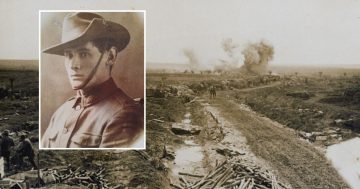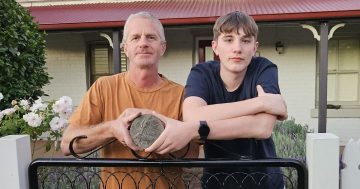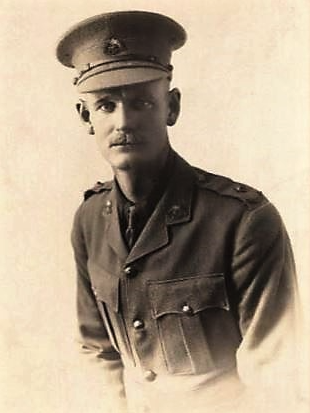
Cecil Rodwell “Caesar” Lucas. Photo: Virtual War Memorial Australia.
The lieutenant in charge of the last party to leave Quinn’s Post as the Australian Imperial Forces evacuated Gallipoli is buried in Narooma Cemetery. Cecil Rodwell Lucas’s story is one of duty, leadership and gallantry.
The letters he wrote home depicted a cheerful and popular man who loved serving his country.
Cecil’s descendants put together a 90-page dossier that chronicled his WWI service sourced from newspapers and the State Library of NSW (SLNSW). His letters to Justice David Ferguson, a prominent judge in Sydney, reveal his character and personality. Those letters, together with the letters of several other officers, are in the Ferguson archive at SLNSW.
In recent years, his neglected grave was restored by Narooma RSL sub-Branch. When his family learnt of the RSL’s work, they sent a copy of the dossier.
Cecil was one of a closely knit group of NSW officers. Many were friends from Sydney Grammar, the University of Sydney or from practice as lawyers in prewar Sydney. At school, his initials, CR, gave him the nickname of Caesar.
The son of a solicitor, Caesar was born in Sydney on 4 June, 1887. He was Senior Prefect at school and stroke of the rowing team. In June 1913, he was appointed clerk/associate to Justice Ferguson and in May 1915, was appointed Lieutenant in the 17th Battalion. He was 6 foot 3 inches (1.9 m and 12 stone 4 pounds (78 kg).
He embarked from Sydney on HMAT Themistocles on 12 May, 1915, and arrived at Suez on 12 June, aged 28. The 17th Battalion landed at Gallipoli at 5 am on 20 August. The letters of other officers described the terrible conditions of trench living (“it was too cold to bathe more than once a month”), where disease and the enemy took their toll, but Caesar’s letters made light of the ordeal.
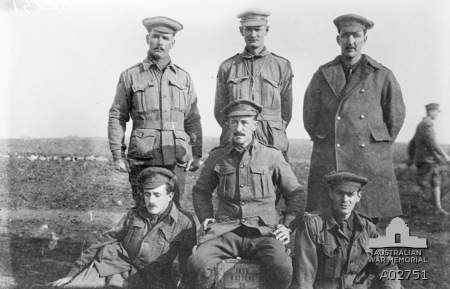
An informal group portrait of officers of the 17th Battalion taken after the evacuation of Gallipoli. Captain Cecil Rodwell Lucas is the officer in the centre standing in the back row. Photo: Australian War Memorial, Accession Number A02751.
He was promoted to temporary Captain on 10 October. A letter to Justice Ferguson describing the closing minutes of the evacuation on 20 December, 1915, tells how the men wore two pairs of socks over their boots to muffle their footsteps.
The history of the 17th Battalion tells how early that day, Caesar shook hands with his commanding officer, Colonel Goddard, who retired to the beach. He then set a record on a gramophone in battalion headquarters, ready to be played. It was the piano march, Turkish Patrol, as ”a graceful compliment to a chivalrous foe”.
Frustrated that he was still temporary Captain, in March 1916, Caesar transferred to the 56th Battalion. It had offered him the “chance of a Company with permanent rank of Captain and a shadowy possibility of promotion”. He disembarked HT Huntsend on 29 June, 1916, in Marseilles and the 56th Battalion was in the front line by July. In September, he organised a highly successful raid on the Germans and was asked to conduct another.
”These raids are delightful things if successful and I have thoroughly enjoyed training these boys for this one,” he wrote.
The recommendation for his Mention in Despatches said, “by Captain Lucas’ training and fine leadership, he was able to inspire a feeling of confidence throughout all ranks of the party and was instrumental to the success of both raids”.
Sir Douglas Haig later wrote of Caesar’s “gallantry and meritorious service” in relation to the raids. He was recorded in the London Gazette for “conspicuous services rendered”. Caesar was promoted to Major in April 1917.
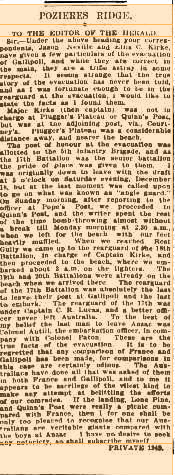
On Thursday, 25 May, 1917, The Sydney Morning Herald published a letter from Private 1949 Leslie Harold Hilder of Cremorne, NSW, who wanted to set the record straight. “The rearguard of the 17th Battalion was absolutely the last to leave their post at Gallipoli and the last to embark. The rearguard of the 17th was under Captain C. R. Lucas, and a better officer never left Australia.” Photo: Trove.
In 1918, he was involved in several battles that forced the Germans to enter the Armistice. Those battles included Peronne in September 1918 where Caesar was second-in-command of the 56th Battalion and was wounded for a second time. Sir Henry Rawlinson, commander of the British Fourth Army, described the battle as “perhaps the greatest military achievement of the war”.
Caesar’s 14th Brigade was in the thick of it. In June 1919, he embarked HT Orita for his return to Australia and went on to try dairy farming near Wingham. From the mid-1920s, Caesar managed a southern ACT property owned by a friend, Colonel Simpson. When the colonel sold Ingledene in 1953, Caesar moved to Narooma.
Ian Noormets, a member of the Narooma RSL sub-Branch, said he understood that Caesar ended his working life managing the caravan park in Narooma on ”the flat”. Caesar died of natural causes in April 1962.







